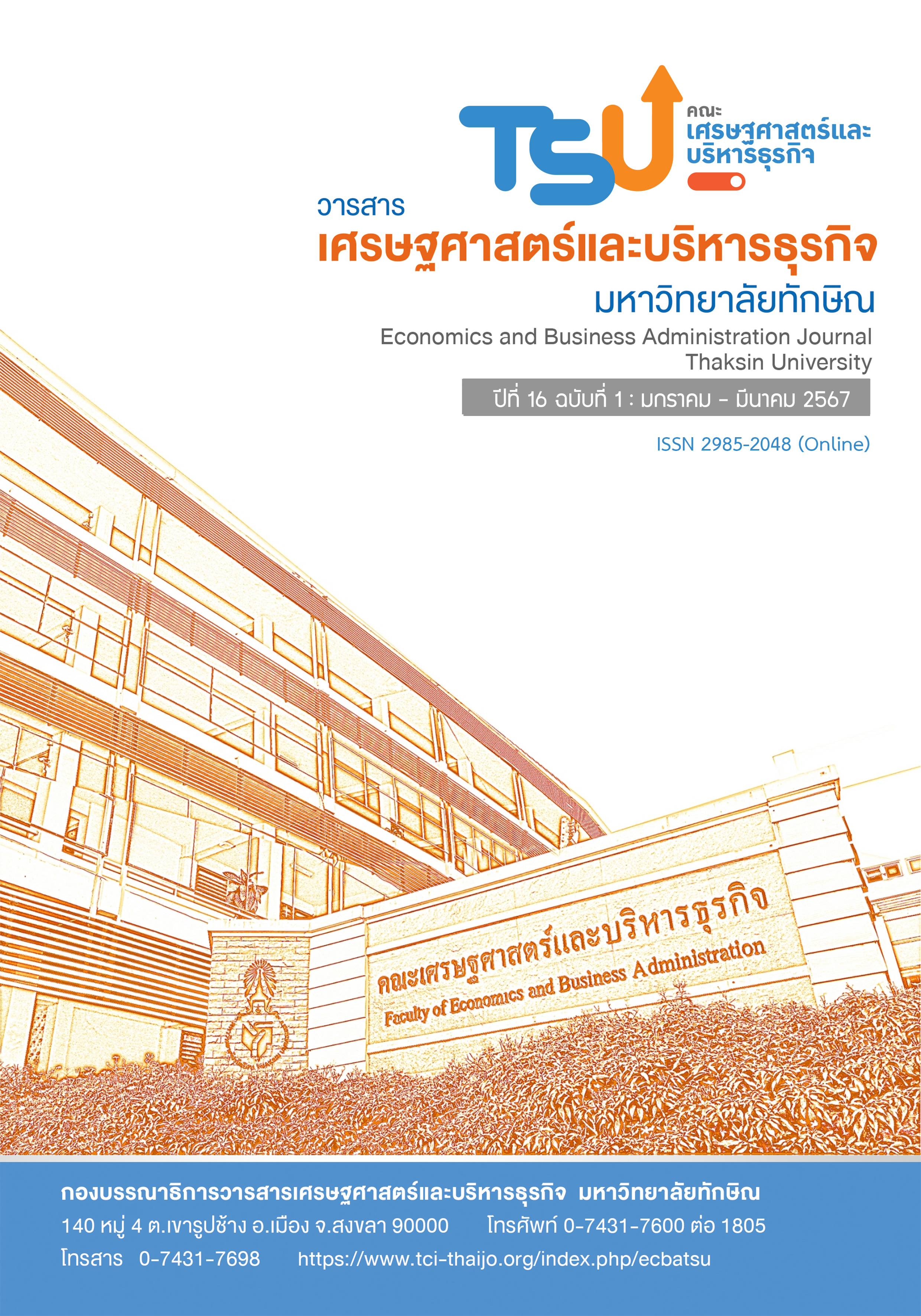Local Participation in Potential Development of Eco-tourism Management at Ko Yo and Nam Noi Subdistricts in Songkhla Province
DOI:
https://doi.org/10.55164/ecbajournal.v16i1.265182Keywords:
Local Participation, Ecotourism, Tourism ManagementAbstract
This research aimed to study; 1) The potential of community participation in developing eco-tourism management in Songkhla Province, 2) The approach studied the relative importance of factors that affect community participation and decision-making of tourists about eco-tourism routes through Songkhla Province.3) The Guidelines in the development of ecotourism management in Songkhla Province. Questionnaires and
in-depth interviews were conducted with 420 randomly sampled individuals resident in Ko Yo and Nam Noi sub-districtsof Songkhla province, 150 tourists who visited Songkhla province, and 15 community leaders and others engaged in tourism management from both the private and public sectors. Analysis of percentages, means and standard deviations indicated that 1) Community participation in the development of ecotourism management in Songkhla Province was generally at a moderate level, 2) The tourists showed a high level of attention to their decision-making about eco-tourism in Ko Yo and Nam Noi sub-districts, 3) Community participation is currently insufficient for the community-based eco-tourism model to be sustainable in the absence of local government and private sector groups with specific management responsibilities for ecotourism.
It was concluded that guidelines are required for the development of the unrealized potential of ecotourism management in Songkhla province that involves community stakeholders in order to plan, implement and monitor the sector to ensure equitable benefits. The results of this research can inform community research and government agencies in the development of policy from which guidelines can be developed.
References
Boonrat, S., & Anantamongkolkul, C. (2019). Community-Based Tourism Management at Ban Bang Phat, Phang Nga Province, a Preliminary Case Study. The 3rd National Academic Conference, Faculty of Tourism Management National Institute of Development Administration.
BuNgarueang, M. (2019). The Development of Community Eco-tourism in Singhanat Subdistrict. Lat Bua Luang District, Phra Nakhon Si Ayutthaya Province. Bangkok: National Institute of Development Administration.
Chuambumrung, T. (2009). Roles of Local Administrative Organizations and Sustainable Tourism Development based on Sufficiency Economy Concepts. Bangkok: Publishing House of the Cabinet and the Royal Gazette.
Hair, J.F (2009). Multivariate Data Analysis. (7th ed.). New Jersey: Prentice Hall.
Janket, K. (2017). Sustainable Community Tourism Management: Case Study: Ko Yo Community, Songkhla Province. Bangkok: Thammasat University.
Jittangwattana, B. (2005). Sustainable Tourism Development. Bangkok: Thammasat University Book Center.
Juspalo, S. (2013). Ecotourism Management by Community Participation Process in the Area. Koh Sarai, Satun Province. Journal of Community Development Research. 6(1), 81-93.
Ko Yo Subdistrict Administrative Organization, Mueang Songkhla district, Songkhla province. Retrived on February 8, 2023 from https://kohyor.go.th/frontpage
Ministry of Tourism and Sport. (2018). National Tourism Development Plan (2021–2022). Bangkok: Office of the Permanent Secretary, Ministry of Tourism and Sports.
Nam Noi Subdistrict Administrative Organization, Hat Yai district, Songkhla province. Retrived on February 8, 2023 from http://www.namnoi.go.th/frontpage,
Pamaranon, P. (2019). Factors Influencing Decision Making for Historical Tourism and Culture of Thai Tourists in Phra Nakhon Si Ayutthaya Province. Independent Study, Master Degree, Bangkok University.
Phopphueksanand, N. (2021). The Participation of the Wat Lam Phaya Floating Market Community Nakhon pathom Province in Sustainable Tourism Management. Journal of Social Science and Buddhistic Anthropology, 6(9), 100-110.
Ratinthorn, S. (2012). Pushing Factors and Pulling Factors Affecting Chinese Tourists in Choosing to Travel in Thailand. APHEIT Journals, 18(1), 84-104.
Rattanaphongpinyo, T. (2016). Public Participation and Environmental Factors in Manage the Eco-tourism of Bang Nam Phueng Floating Market. Phechaburi: Silpakorn University.
Songkhla Province. (2021). Retrived on February 8, 2023 from https://www.songkhla.go.th/frontpage
Sonloy, W. (2019). Participation of Local Communities in Creative Tourism Management of Ban Rim Klong Community, Muang District, Samut Songkhram Province. Phechaburi: Silpakorn University.
Suansri, P. (2017). Community Based Tourism (CBT). Tourism Economy Report, 2017(7), 251-253.
Thuaycharoen, P., & Kangsadaporn, A. (2019). People's Participation in Sustainable Ecotourism Development in Koh Phangan District, Surat Thani Province. Paper Presented at the 14th National Graduate Studies Conference. University of the Thai Chamber of Commerce, Academic Year 2019. 126 -136.
Tiapaiboon, P. (2014). Potential of Community-based Eco-tourism Tourism Ban Hua Non Wat, Mae Tom Sub-district, Bang Klam District, Songkhla Province. Hat Yai: Faculty of Environmental Management, Prince of Songkla University.
Zakia, K. (2021). Ecotourism in Indonesia: Local Community Involvement and The Affecting Factors. Journal of Governance and Public Policy, 8(4), 93-105.
Downloads
Published
How to Cite
Issue
Section
License
Copyright (c) 2024 Faculty of Economics and Business Administration, Thaksin University

This work is licensed under a Creative Commons Attribution-NonCommercial-NoDerivatives 4.0 International License.




